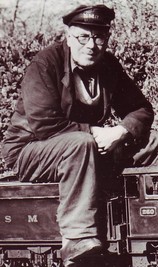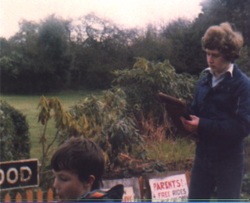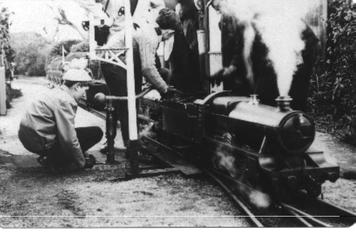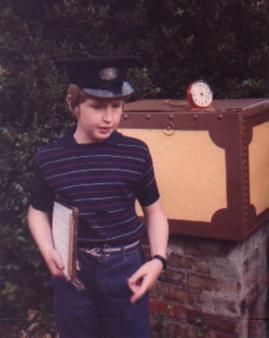People at Saltwood Miniature Railway
Alexander Carlisle Schwab

Alex Schwab, Owner
Alexander Carlisle Schwab entered into life on 12th March 1905. His grandfather had come to England from Germany some years earlier, and the family home had been established at Sheffield.
After attending private schools as a day-boy, Alex Schwab went up to Cambridge (Emmanuel College) in 1922. He took a 3rd in Mechanical Sciences in 1926, and took his MA in 1933.
He was a gifted engineer, and was due to study under R. E. L. Maunsell, the Chief Mechanical Engineer of the Southern Railway, at Ashford Railway Works, when medical advice suddenly cut short his career, following a recurrence at Cambridge of an earlier middle-ear infection, which had first struck him at secondary school. Despite undergoing painful surgery, Alex Schwab was unable to take up his pupilage, or to advance his career.
Alex Schwab’s father, Frank Clement Schwab, anticipating the pupilage under Maunsell, had relocated the family from Sheffield to Saltwood in 1924, the same year as his own early retirement. When Alex’s career collapsed, both men turned their full attentions to the Saltwood Miniature Railway as a life-long project in engineering.
Alex Schwab was not only a talented engineer, but also a very gifted sculptor, despite taking up this interest only after his 40th birthday! A studio was built in the grounds at Saltwood, and many local children modeled for him there. Alex Schwab’s particular talent was for the sculpting of life statuettes and busts of children. Five of his pieces were exhibited at the Society of watercolour Sculptors’ Exhibition, and in 1963 one piece was displayed in the Royal Academy.
Alex Schwab was an avid tennis fan and belonged to Hythe Tennis Club from 1932 onwards. His playing only ended with his deepening illness.
Around 1970 Alex was taken ill, and diagnosed with mental health problems. The Saltwood Miniature Railway closed at the end of 1970, and it’s owner’s behaviour became increasingly erratic, to the concern of neighbours and villagers generally. For four years doctors treated him, and attempted to return the balance of his mind to normal. During this time his physical health also suffered, and Alex Schwab even had the eerie experience of reading his own obituary in a leading railway magazine, which had responded to premature rumours of Schwab’s demise!
Happily, recovery came, and at the end of 1974 the railway re-opened. Alex Schwab also resumed his daily walk to Hythe where he would often spend time on the beach, and where he continued to visit the Tennis Club. His playing days were now over, but he took on responsibility for trimming the hedges around the courts.
Alex Schwab died in 1987, his funeral being conducted at a crematorium between Canterbury and Folkestone by the Revd. Canon Guy L’Estrange, the Rector of Saltwood, who had been for twenty years a regular passenger on the railway. Thus closed a chapter of railway history, and the Saltwood Miniature Railway never ran again.
After attending private schools as a day-boy, Alex Schwab went up to Cambridge (Emmanuel College) in 1922. He took a 3rd in Mechanical Sciences in 1926, and took his MA in 1933.
He was a gifted engineer, and was due to study under R. E. L. Maunsell, the Chief Mechanical Engineer of the Southern Railway, at Ashford Railway Works, when medical advice suddenly cut short his career, following a recurrence at Cambridge of an earlier middle-ear infection, which had first struck him at secondary school. Despite undergoing painful surgery, Alex Schwab was unable to take up his pupilage, or to advance his career.
Alex Schwab’s father, Frank Clement Schwab, anticipating the pupilage under Maunsell, had relocated the family from Sheffield to Saltwood in 1924, the same year as his own early retirement. When Alex’s career collapsed, both men turned their full attentions to the Saltwood Miniature Railway as a life-long project in engineering.
Alex Schwab was not only a talented engineer, but also a very gifted sculptor, despite taking up this interest only after his 40th birthday! A studio was built in the grounds at Saltwood, and many local children modeled for him there. Alex Schwab’s particular talent was for the sculpting of life statuettes and busts of children. Five of his pieces were exhibited at the Society of watercolour Sculptors’ Exhibition, and in 1963 one piece was displayed in the Royal Academy.
Alex Schwab was an avid tennis fan and belonged to Hythe Tennis Club from 1932 onwards. His playing only ended with his deepening illness.
Around 1970 Alex was taken ill, and diagnosed with mental health problems. The Saltwood Miniature Railway closed at the end of 1970, and it’s owner’s behaviour became increasingly erratic, to the concern of neighbours and villagers generally. For four years doctors treated him, and attempted to return the balance of his mind to normal. During this time his physical health also suffered, and Alex Schwab even had the eerie experience of reading his own obituary in a leading railway magazine, which had responded to premature rumours of Schwab’s demise!
Happily, recovery came, and at the end of 1974 the railway re-opened. Alex Schwab also resumed his daily walk to Hythe where he would often spend time on the beach, and where he continued to visit the Tennis Club. His playing days were now over, but he took on responsibility for trimming the hedges around the courts.
Alex Schwab died in 1987, his funeral being conducted at a crematorium between Canterbury and Folkestone by the Revd. Canon Guy L’Estrange, the Rector of Saltwood, who had been for twenty years a regular passenger on the railway. Thus closed a chapter of railway history, and the Saltwood Miniature Railway never ran again.
The Traffic Manager

The Traffic Manager with the train log.
SMR had two owner/operators throughout its history - Frank Schwab, and Alex Schwab. In steam days they were assisted by a variety of helpers, including many engineers both professional and amateur. There is no doubt that the active work of Henry Greenly on the line (present in the area because he was working on the slightly newer Romney, Hythe and Dymchurch Light Railway) is SMR’s single greatest claim to world-class staff members! From the start budding junior engineers also assisted, and photographic evidence shows boys helping to organise stations and water locomotives.
When the line re-opened in 1974 Frank Schwab was long deceased, and there were no longer other interested miniature railway enthusiasts in the village. So for the 13 years of electric operation, Alex Schwab was assisted by a team of boys who sold tickets, kept train logs, managed the station, and provided extra muscle in the event of a derailment. This team was led by a Traffic Manager, who was an older teenager. The Traffic Manager was paid (in the present author's own time it was the princely sum of £3 per week - £156 per year) and his duties included not only staff management on open days, but also a range of duties each Saturday throughout the year, including track cleaning, path laying, grass cutting, hedge clipping, cutting clearing, tunnel cobwebbing, and other general maintenance.
On public open days (which happened during all three school holiday periods - Summer, Christmas, and Easter) the Traffic Manager supervised the younger boys, and ensured that the traffic logs were accurate - these recorded the start and finish time of each train, the total loading, and the total ticket sales. Remarkably, every public train operated throughout the history of SMR was fully logged in this way, and Alex Schwab retained these fascinating statistics. The staff were provided with “afternoon tea” at around 4pm on each operating day. This always consisted of a plastic jug of water, and a white and brown tin containing chocolate bourbon biscuits - Alex Schwab's biscuit of choice. The Traffic Manager ensured that everyone got their share!
When the line re-opened in 1974 Frank Schwab was long deceased, and there were no longer other interested miniature railway enthusiasts in the village. So for the 13 years of electric operation, Alex Schwab was assisted by a team of boys who sold tickets, kept train logs, managed the station, and provided extra muscle in the event of a derailment. This team was led by a Traffic Manager, who was an older teenager. The Traffic Manager was paid (in the present author's own time it was the princely sum of £3 per week - £156 per year) and his duties included not only staff management on open days, but also a range of duties each Saturday throughout the year, including track cleaning, path laying, grass cutting, hedge clipping, cutting clearing, tunnel cobwebbing, and other general maintenance.
On public open days (which happened during all three school holiday periods - Summer, Christmas, and Easter) the Traffic Manager supervised the younger boys, and ensured that the traffic logs were accurate - these recorded the start and finish time of each train, the total loading, and the total ticket sales. Remarkably, every public train operated throughout the history of SMR was fully logged in this way, and Alex Schwab retained these fascinating statistics. The staff were provided with “afternoon tea” at around 4pm on each operating day. This always consisted of a plastic jug of water, and a white and brown tin containing chocolate bourbon biscuits - Alex Schwab's biscuit of choice. The Traffic Manager ensured that everyone got their share!
Some of the railway staff over the years...
The Steam EraChief Engineer
Frank Schwab (Chief Engineer 1920-1927) Alex Schwab (Chief Engineer 1927-1987) Henry Greenly (Consulting Locomotive Engineer 1937-1943) Other Staff This list is incomplete - please submit your name for inclusion. Roger Cradduck Raymond Clark David Harris |
The Electric EraChief Engineer
Alex Schwab Traffic Manager Timothy Lowe (1978-1982) Jeremy Lowe (1982-1983) Timothy L'Estrange (1983-1987) Other Staff This list is incomplete - please submit your name for inclusion. Ian Fraser William Eaton Ian May Nigel May Nicholas Falconer Christopher Buck Samuel Tordoff Nicholas Apps |

